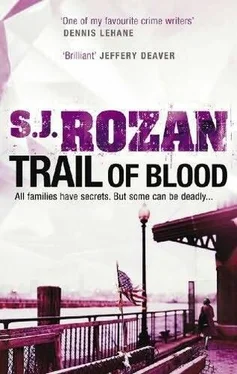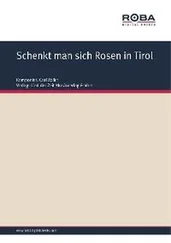S Rozan - Trail of Blood
Здесь есть возможность читать онлайн «S Rozan - Trail of Blood» весь текст электронной книги совершенно бесплатно (целиком полную версию без сокращений). В некоторых случаях можно слушать аудио, скачать через торрент в формате fb2 и присутствует краткое содержание. Жанр: Триллер, на английском языке. Описание произведения, (предисловие) а так же отзывы посетителей доступны на портале библиотеки ЛибКат.
- Название:Trail of Blood
- Автор:
- Жанр:
- Год:неизвестен
- ISBN:нет данных
- Рейтинг книги:5 / 5. Голосов: 1
-
Избранное:Добавить в избранное
- Отзывы:
-
Ваша оценка:
- 100
- 1
- 2
- 3
- 4
- 5
Trail of Blood: краткое содержание, описание и аннотация
Предлагаем к чтению аннотацию, описание, краткое содержание или предисловие (зависит от того, что написал сам автор книги «Trail of Blood»). Если вы не нашли необходимую информацию о книге — напишите в комментариях, мы постараемся отыскать её.
Trail of Blood — читать онлайн бесплатно полную книгу (весь текст) целиком
Ниже представлен текст книги, разбитый по страницам. Система сохранения места последней прочитанной страницы, позволяет с удобством читать онлайн бесплатно книгу «Trail of Blood», без необходимости каждый раз заново искать на чём Вы остановились. Поставьте закладку, и сможете в любой момент перейти на страницу, на которой закончили чтение.
Интервал:
Закладка:
All this, I think, would be exotic and strange, and yet I’d square my shoulders and get on with learning to recognize a streetcar stop and distinguish the currency-as well as adjusting to boiling the water, and peeling what little fresh fruit I find-were it not for the intermittent intrusions of sounds and smells from home. Acrid smoke carries the stench of sewage and the unfamiliar aromas of Chinese spices-but then we catch a whiff of coffee or cinnamon from some lucky refugee’s kitchen. These things are not unavailable here, only beyond most refugees’ reach. People will save for weeks to buy enough coffee to brew a single pot, which they’ll sip slowly, not knowing when they’ll taste it again.
Mama, it’s these familiar things that make the heart pound. One feels as if in a dream, where the real and fantastic exist side by side, where it’s no good to determine to get on with anything, as one could be lifted into the sky, or houses in a lane could turn to trees in a forest, at any second.
Oh, I sound so foolish! And yet this is how I’ve felt this past week, as I make my way around Shanghai. More than once I’ve stopped still and tried, as I do in frightening dreams, simply to will myself awake. The Nazis never marched into Austria. Paul and I never fled to Shanghai – Shanghai, how absurd!-leaving you and Uncle Horst behind. The Nazis themselves don’t exist, but are monsters of my imagination. But my efforts result in no effect: I’m awake and all this is only too real.
Now you’ll worry I’m going mad. Please don’t fear. As long as I have Paul to look after I’ll keep my feet on the ground, I promise. And I don’t hesitate to admit I’ve been greatly aided by my friend, Chen Kai-rong. Though he made sure I had his address before we parted, I’d decided not to contact him until Paul and I were no longer living in these squalid, communal conditions. Pride, I suppose, made me want to meet him again as an equal, as aboard the ship. But two days ago, Paul and I were summoned from the roof where, on the lines that crisscross it, we were hanging out laundry. (This in itself is almost a joke, Mama, because nothing dries in Shanghai.) The child who’d run to fetch us said a Chinese gentleman was at the door in a fine car, asking if he’d found the Home in which the Gilders stayed. I hesitated, but Paul-who does not find laundry entrancing-let out a cheer and galloped down the stairs. I followed, to find Kai-rong standing beside a Mercedes-Benz. He quite beamed when he saw us, and I’m afraid I did the same, though propriety might have demanded a more restrained response. He requested the pleasure of taking us to tea. I was embarrassed by the state of my hands, my hair, my dress; but I couldn’t refuse Paul this treat. We set off, ignoring the pursed lips of some of our fellow residents, who seem to think a refugee girl entering a Chinese gentleman’s car can mean only one thing, even with her younger brother at her side.
My discomfort at having been discovered in our meager circumstances found no echo in Kai-rong, who was full of practical questions: Was the food passable, were we learning our way around, did we understand the bank notes? We spent a lovely hour at a lakeside teahouse occupied, except for Paul and myself, exclusively by Chinese. Paul devoured the tea cakes; as for me, even the mediocrity of my recent diet hasn’t increased my enthusiam for these dainties. But the tea was sweet, and swans floated by, and I suppose I’m growing used to Chinese music because I found the quartet quite pleasing. Kai-rong explained the instruments and their tuning, we discussed Mozart and literature, and I was very sorry when we had to leave.
Kai-rong had his driver take us back on a wandering path, as he pointed out landmarks to familiarize us with our new home. The tour was enlightening; but it was the comfort of Kai-rong’s presence that made me feel, as on shipboard, connected to this time and place.
Your foolish, but entirely rational,
Rosalie
23 May 1938
Dear Mama,
We’ve been here two weeks and it seems a lifetime.
Who could ever have imagined? The Pesach tales of oppression, which I once dismissed as part myth, part ancient history, and wholly unrelated to our enlightened age, have risen from the pages of the Haggadah to come howling after us. Once again we’re fleeing, scattering to the winds. Over the thin kasha soup and rough bread that serves as dinner at the Home, one hears of relatives making for Australia, Argentina, the Dominican Republic-oh, Mama, I don’t believe I could find that island on a map, and yet it’s rumored that, alone in the world but for Shanghai, its doors remain open.
And reverently people speak of the Promised Land, America. America? Which issues only a miserably few visas to refugees, desperate as we are? Why does anyone believe America will be more hospitable once they pry open its doors? And yet so many plan and scheme and hope: A former employer who fled to Chicago will send for them, or cousins in New York will sponsor them, and the gates of paradise will swing wide.
No, I say. Shanghai is mystifying and often harsh; nevertheless, it’s welcomed us. Until insanity is overthrown and our homes restored, my home is here.
Oh, what a demagogue I’ve become! I’m sorry; worry over you and Uncle Horst, over the future, over how to know I’m doing the right things for Paul-over whether I’ll find kasha soup in my bowl again tomorrow-combines with a helpless anger, and leads to a darkness I haven’t known before.
Others feel this darkness, too, the result of worry and the inability to find work, a place to live, decent food-to take any action in any direction. At the Home you see people-a small number, but real-who sit all day in the canteen or on their cots, who have little to say and will not try the streets of Shanghai, who no longer spend effort to stay clean and groomed-and it is an effort here, Mama, but one I force myself to make and demand of Paul. This darkness thickens imperceptibly: I didn’t realize I had fallen into its shadow until our outing with Kai-rong. For the brief period of that afternoon, Shanghai seemed not like a frightening dream, but merely a place. Bizarre and mystifying, admittedly, but nevertheless a solid, daytime place whose streets and customs could, with application, be understood.
I’m telling you this, Mama, because I want you to understand a decision I’ve made: after wrenching consideration, I’ve determined to sell Grandmother Gilder’s ruby ring. I’m afraid to stay too long at the Home, afraid of what the dreariness will do to my heart and Paul’s. The price of the ring should enable us to pay what’s called “key money”-pure extortion, but every landlord demands it-and also, I hope, to pay Paul’s school fees when I find him a place. He claims to be perfectly happy in his truancy, and asks that I not sell anything for his sake; but I don’t believe him. He hasn’t seen the inside of an incomprehensible science text since we left the ship, so how could he be happy? And even if he were, nevertheless he should be in school.
Accordingly, tomorrow I’ll set off into the French Concession-a beautiful area, with villas on tree-lined streets, as opposite to Hongkew as you can imagine; Kai-rong took us through it. The finest shops are there, and Kai-rong has given me the names of jewelers of good reputation. I’ll search one out, and return to Hongkew richer, though, I think, much poorer also.
I’ve chosen the ring because it’s mine. Yes, I remember my vow to renounce sentimentality; but to regard your jewelry, Mama, as mineral banknotes isn’t easy without you here to tell me to do it! Until you come, I have nothing but your photograph and my memories. These include watching you dress for elegant evenings, and the magical moment when you fixed the diamond necklace at your throat and became Queen Mama, and I became Princess Rosalie. That necklace especially, but also the gold bracelet, and the others-yes, yes, I will sell them if I must, I won’t let Paul starve! But if there’s a way, I would dearly love to see you, when you are here in Shanghai, as Queen Mama once more!
Читать дальшеИнтервал:
Закладка:
Похожие книги на «Trail of Blood»
Представляем Вашему вниманию похожие книги на «Trail of Blood» списком для выбора. Мы отобрали схожую по названию и смыслу литературу в надежде предоставить читателям больше вариантов отыскать новые, интересные, ещё непрочитанные произведения.
Обсуждение, отзывы о книге «Trail of Blood» и просто собственные мнения читателей. Оставьте ваши комментарии, напишите, что Вы думаете о произведении, его смысле или главных героях. Укажите что конкретно понравилось, а что нет, и почему Вы так считаете.












